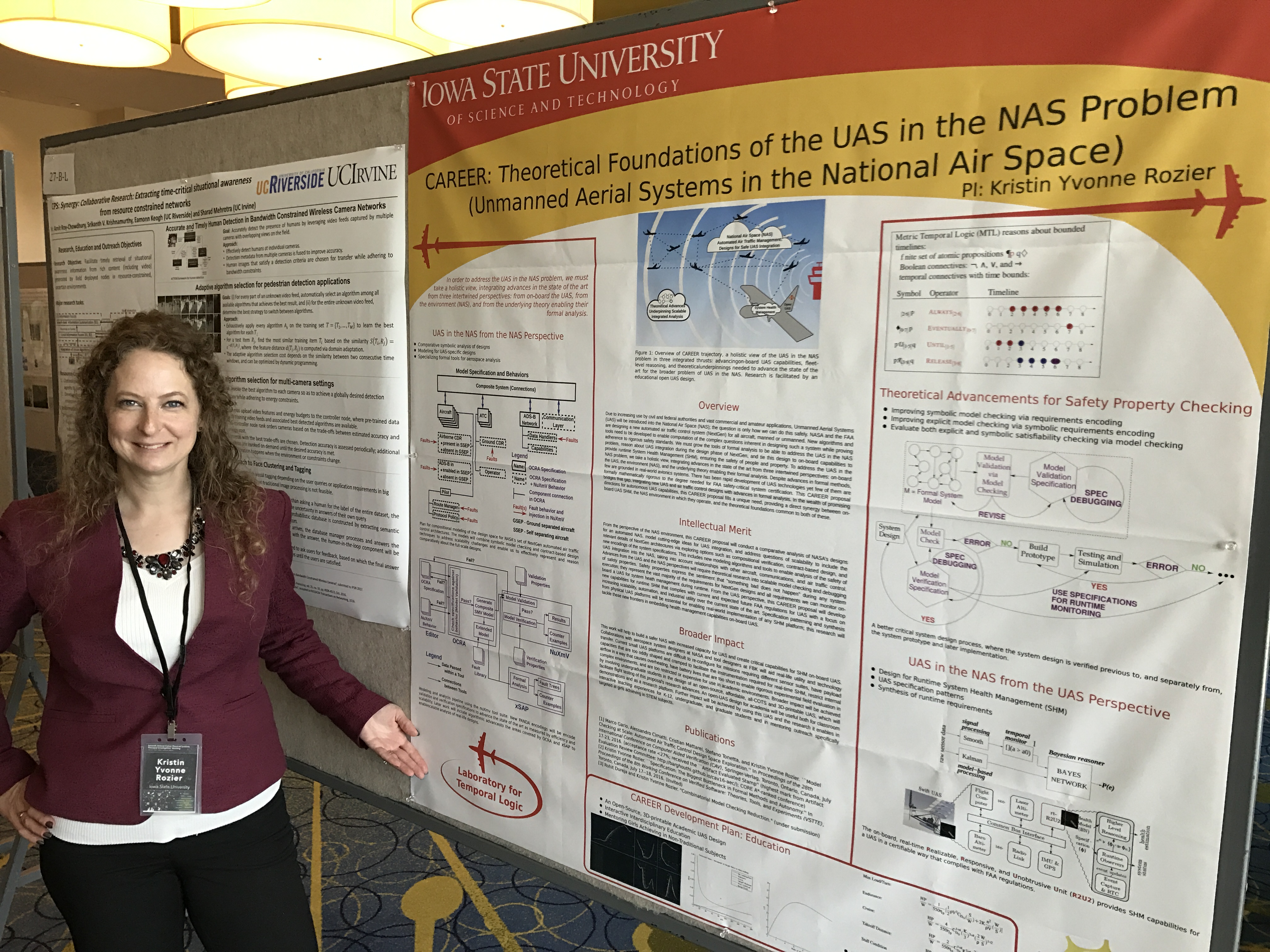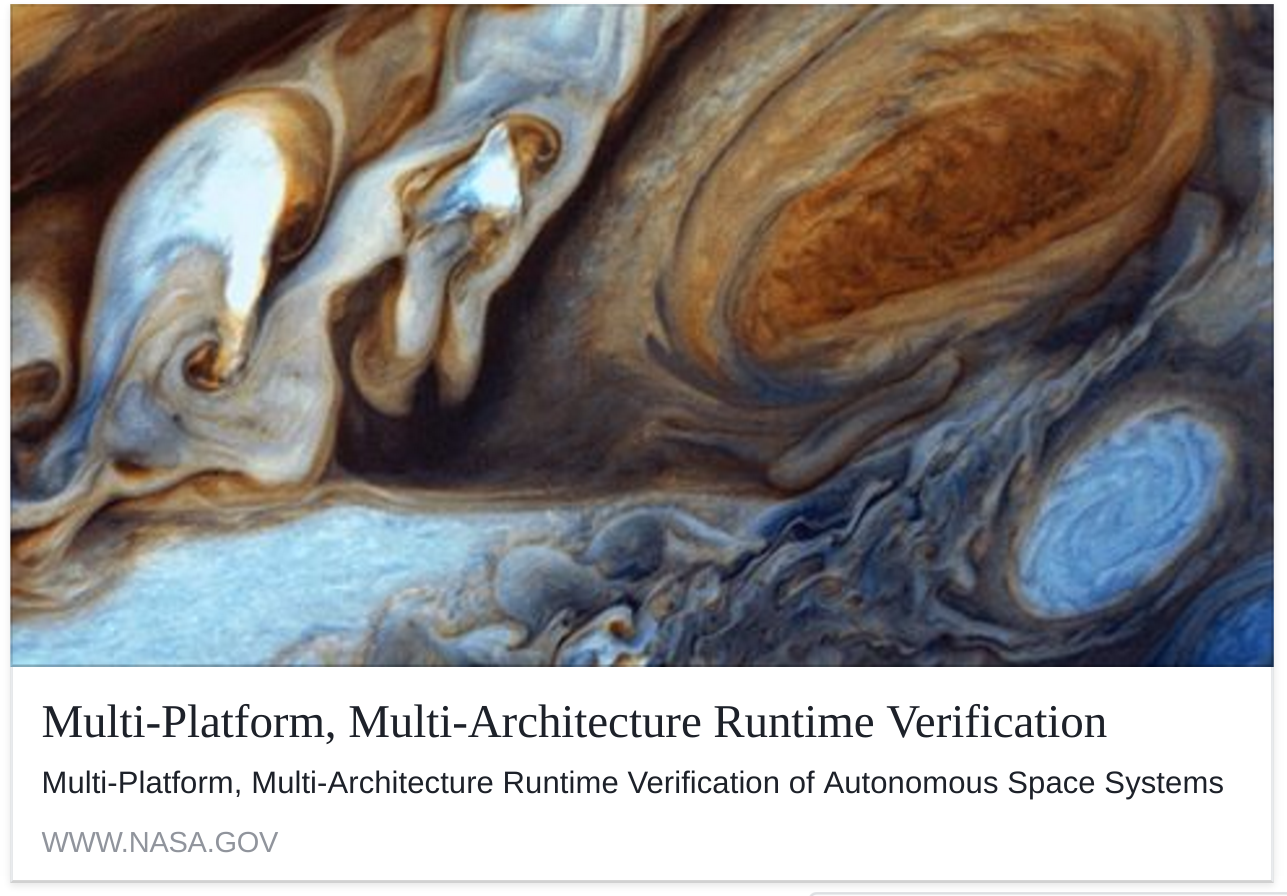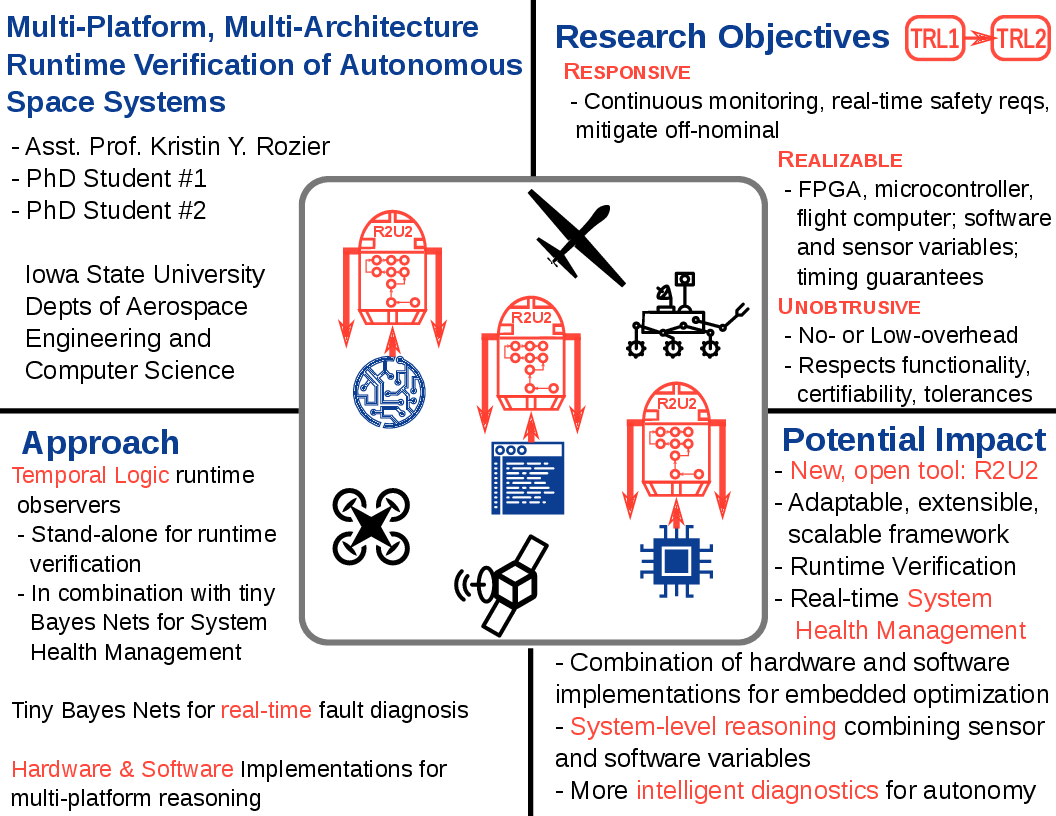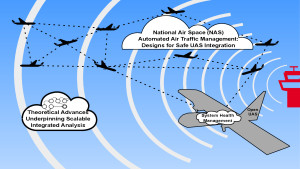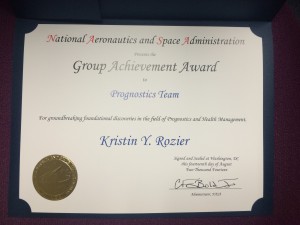https://www.linkedin.com/embed/feed/update/urn:li:share:7235334577848754176
Category Archives: Awards
Two Cyclone engineers receive NSF grant to create a smarter aircraft and spacecraft
Filed under Awards, Laboratory Collaborations, News Features
Aerospace Engineering’s Rozier receives Black and Veatch Building a World of Difference in Engineering Fellowship
Filed under Awards, News Features, Uncategorized
Patrick Moosbrugger Wins 2016 Kapsch Award
Congratulations to Ph.D. student Patrick Moosbrugger, recipient of the 2016 Kapsch Award for the best Masters thesis from the University of Applied Sciences, Technikum Wien! The Kapsch Award is given for the combination of the innovations and contributions of the MS thesis, outstanding academic performance of the student in coursework, and completing the MS degree exam with honors. Patrick was one of seven awardees across 18 MS degree programs. His MS thesis advances system health management for both safety and security requirements using R2U2.
The story is covered in several places:
- From the Austrian Press Agency (only German):
http://science.apa.at/rubrik/bildung/Kapsch_Award_fuer_die_besten_Masterthesen_von_der_FH_Technikum_Wien/SCI_20161104_SCI39411351832842748 - From the sponsor KAPSCH (pdf or webpage in English):
https://www.kapsch.net/getattachment/bce9c3cd-f746-448f-a0af-40b98d2a6716/kag_161104_pr
https://www.kapsch.net/KapschGroup/press/kapschgroup/kag_161104_pr - Additional pictures are here:
https://alumni.technikum-wien.at/fotos/kapsch-award-verleihung-2016
Filed under Awards, Laboratory Collaborations, News Features
2016 NSF Cyber-Physical Systems Principal Investigators’ Meeting
PI Prof. Kristin Yvonne Rozier presented a poster on current grant “CAREER: Theoretical Foundations of the UAS in the NAS Problem (Unmanned Aerial Systems in the National Air Space)” at the 2016 NSF Cyber-Physical Systems Principal Investigators’ Meeting October 31-November 1, 2016. This seventh annual Cyber-Physical Systems (CPS) PI meeting gathered researchers and collaborators from around the world!
According to the NSF, “The CPS Principal Investigators’ Meeting provided a forum for a wide range of stakeholders in academia, industry, and Federal agencies to review new developments in CPS foundations, to identify new, emerging applications, and to discuss technology gaps and barriers. The program of the meeting included presentations about projects funded by NSF and other agencies, keynotes, panels, discussion groups, and poster & demonstration sessions.”
This year’s NSF CPS PI meeting was held at the Renaissance Arlington Capital View (RACV) Hotel located in the Crystal City Community of Arlington, Virginia at 2800 South Potomac Avenue, Arlington, Virginia 22202. The RACV is 0.9 miles from the Reagan Washington National Airport (DCA). Watching the planes land that will someday fly our research is an exciting experience!
Filed under Awards, Research Talks
Patrick Moosbrugger Wins Würdigungspreis Award for His MS Thesis
Patrick Moosbrugger received the “Würdigungspreis” of the Federal Ministry of Science Research and Economy for his master thesis entitled “A Real-time, On-board System Health Management Unit for Unmanned Aerial Systems”. The thesis, done in cooperation with NASA Ames Research Center deals with runtime monitoring and diagnosis for unmanned aerial systems. The thesis is also related to Patricks work in the Josef Ressel Center for Verification of Embedded Computing Systems at TU Vien.
More information about this award is available in German here (https://www.technikum-wien.at/newsroom/news/wuerdigungspreis-fuer-patrick-moosbrugger) and here (http://wissenschaft.bmwfw.gv.at/index.php?id=3791).
Filed under Awards, News Features, Publication Highlights
Prof. Kristin Yvonne Rozier Wins NASA Early Career Faculty (ECF) Award
NASA’s Space Technology Mission Directorate (STMD) announced today that the proposal by Prof. Kristin Yvonne Rozier entitled “Multi-Platform, Multi-Architecture Runtime Verification of Autonomous Space Systems” was selected for funding under the call for Verification and Validation of Autonomous Systems.
According to NASA: “The Early Career Faculty (ECF) component of the Space Technology Research Grants Program awards grants to accredited U.S. universities on behalf of outstanding faculty researchers early in their careers. ECF challenges early career faculty to examine the theoretical feasibility of ideas and approaches that are critical to making science, space travel, and exploration more effective, affordable, and sustainable. Awards result from successful proposals to the ECF Appendix to the SpaceTech-REDDI NASA Research Announcement. The ECF Appendix is expected to be released at least biannually and will feature specific topics. Awards are expected to be a maximum of three years in duration and the typical award amount is $200K/year.”
Abstract:
Autonomous systems are only capable of effective self-governing if they can reliably sense their own faults and respond to failures and uncertain environmental conditions. We propose to design a real-time, onboard runtime verification and system health management (SHM) framework called R2U2, to continuously monitor essential system components such as sensors, software, and hardware for detection and diagnosis of failures and violations of safety or performance rules during the mission of autonomous space systems, such as rovers, small satellites, or Unmanned Aerial Systems (UAS) flying in the skies of other planets. R2U2 is multi-platform and multi-architecture to address the requirements and capabilities of these embedded systems. R2U2 stands for Responsive, Realizable, Unobtrusive Unit; it is named after its three crucial properties that are currently absent from state-of-the-art SHM capabilities. Responsiveness means evaluating system health in real time, with provable timing and performance guarantees. Realizability involves being adaptable, extensible, and scalable to multiple platforms and architectures. Unobtrusiveness requires R2U2 to operate without altering crucial properties of the system: functionality, certifiability, timing, or tolerances for size, weight, power, telemetry bandwidth, software overhead. A full-scale version of R2U2, with options for hardware- and software-based implementations would have tremendous impact on the ability of autonomous space systems to perform real-time system-level reasoning about their health.
Congratulations to the seven fellow NASA ECF Award Winners: Necmiye Ozay (University Of Michigan), Seok Woo Lee (University of Connecticut), SungWoo Nam (University of Illinois at Urbana-Champaign), Sonia Chernova (Georgia Institute of Technology), Dimitra Panagou (University Of Michigan), Daniel Szafir (University Of Colorado, Boulder), and Stefanie Tellex (Brown University).
Filed under Awards, News Features
Prof. Kristin Yvonne Rozier wins NSF CAREER Award
The National Science Foundation (NSF) Cyber-Physical Systems (CPS) Program announced today that the proposal by Prof. Kristin Yvonne Rozier entitled CAREER: Theoretical Foundations of the UAS in the NAS Problem (Unmanned Aerial Systems in the National Air Space) was selected for funding.
According to the NSF: “The Faculty Early Career Development (CAREER) Program is a Foundation-wide activity that offers the National Science Foundation’s most prestigious awards in support of junior faculty who exemplify the role of teacher-scholars through outstanding research, excellent education and the integration of education and research within the context of the mission of their organizations. Such activities should build a firm foundation for a lifetime of leadership in integrating education and research.”
The following is a quote from the NSF’s Program Description for the CAREER award:
“This premier program emphasizes the importance the Foundation places on the early development of academic careers dedicated to stimulating the discovery process in which the excitement of research is enhanced by inspired teaching and enthusiastic learning. Effective integration of research and education generates a synergy in which the process of discovery stimulates learning, and assures that the findings and methods of research and education are quickly and effectively communicated in a broader context and to a larger audience.
“The CAREER program embodies NSF’s commitment to encourage faculty and academic institutions to value and support the integration of research and education. Successful PIs will propose creative, integrative and effective research and education plans, developed within the context of the mission, goals, and resources of their organizations, while building a firm foundation for a lifetime of contributions to research, education and their integration.”
Abstract: Theoretical Foundations of the UAS in the NAS Problem
Due to their increasing use by civil and federal authorities and vast commercial and amateur applications, Unmanned Aerial Systems (UAS) will be introduced into the National Air Space (NAS); the question is only how this can be done safely. Today, NASA and the FAA are designing a new, (NextGen) automated air traffic control system for all aircraft, manned or unmanned. New algorithms and tools will need to be developed to enable computation of the complex questions inherent in designing such a system while proving adherence to rigorous safety standards. Researchers must develop the tools of formal analysis to be able to address the UAS in the NAS problem, reason about UAS integration during the design phase of NextGen, and tie this design to on-board capabilities to provide runtime System Health Management (SHM), ensuring the safety of people and property on the ground. This proposal takes a holistic view and integrates advances in the state of the art from three intertwined perspectives to address safe integration of unmanned systems into the national airspace: from on-board the vehicle, from the environment (NAS), and from the underlying theory enabling their formal analysis. There has been rapid development of new UAS technologies yet few of them are formally mathematically rigorous to the degree needed for FAA safety-critical system certification. This project bridges that gap, integrating new UAS and air traffic control designs with advances in formal analysis. Within the wealth of promising directions for autonomous UAS capabilities, this project fills a unique need, providing a direct synergy between on-board UAS SHM, the NAS environment in which they must operate, and the theoretical foundations common to both of these.
This research will help to build a safer NAS with increased capacity for UAS and create broadly impactful capabilities for SHM on-board UAS. Advancements will require theoretical research into more scalable model checking and debugging of safety properties. Safety properties express the sentiment that “something bad does not happen” during any system execution; they represent the vast majority of the requirements for NextGen designs and all requirements researchers can monitor on-board a UAS for system heath management during runtime. This research will tackle new frontiers in embedding health management capabilities on-board UAS. Collaborations with aerospace system designers at the National Aeronautics and Space Administration and tool designers at the Bruno Kessler Foundation will aid real-life utility and technology transfer. Broader impact will be achieved by involving undergraduate students in the design of an open-source, affordable, all-COTS and 3D-printable UAS, which will facilitate flight testing of this project’s research advances. An open-UAS design for academia will be useful both for classroom demonstrations and as a research platform. Further impact will be achieved by using this UAS and the research it enables in interactive teaching experiences for K-12, undergraduate, and graduate students and in mentoring outreach specifically targeted at girls achieving in Science, Technology, Engineering and Mathematics (STEM) subjects.
Filed under Awards, News Features
Aerospace Engineering and Data Science!
CEAS News features the Laboratory for Temporal Logic today with a story about Professor Kristin Yvonne Rozier and friend of the Lab, Professor Eric W. D. Rozier: “UC Power Couple Uses Data Science for Social Good.”

Data Science for Social Good, Day 1
As Faculty Fellows at the Eric and Wendy Schmidt Data Science for Social Good (DSSG) Fellowship, the Professors Rozier serve as Technical Mentors for projects aimed at using data science to make a difference.
Filed under Awards, News Features
NASA Group Achievement Award
The announcement featuring Dr. Rozier’s Group Achievement Award from NASA has been posted to CEAS Homepage News and University of Cincinnati news.
 CEAS Welcomes NASA Award Winner, Kristin Yvonne Rozier, PhD, University of Cincinnati As one of the several new faculty members added to the UC College of Engineering and Applied Science, Kristin Yvonne Rozier continues to prove her excellence with her Group Achievement Award from NASA. Read more…
CEAS Welcomes NASA Award Winner, Kristin Yvonne Rozier, PhD, University of Cincinnati As one of the several new faculty members added to the UC College of Engineering and Applied Science, Kristin Yvonne Rozier continues to prove her excellence with her Group Achievement Award from NASA. Read more…
Filed under Awards, News Features


